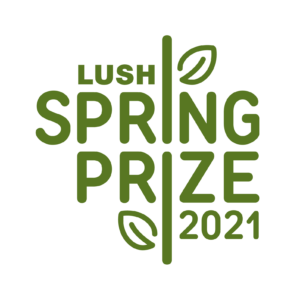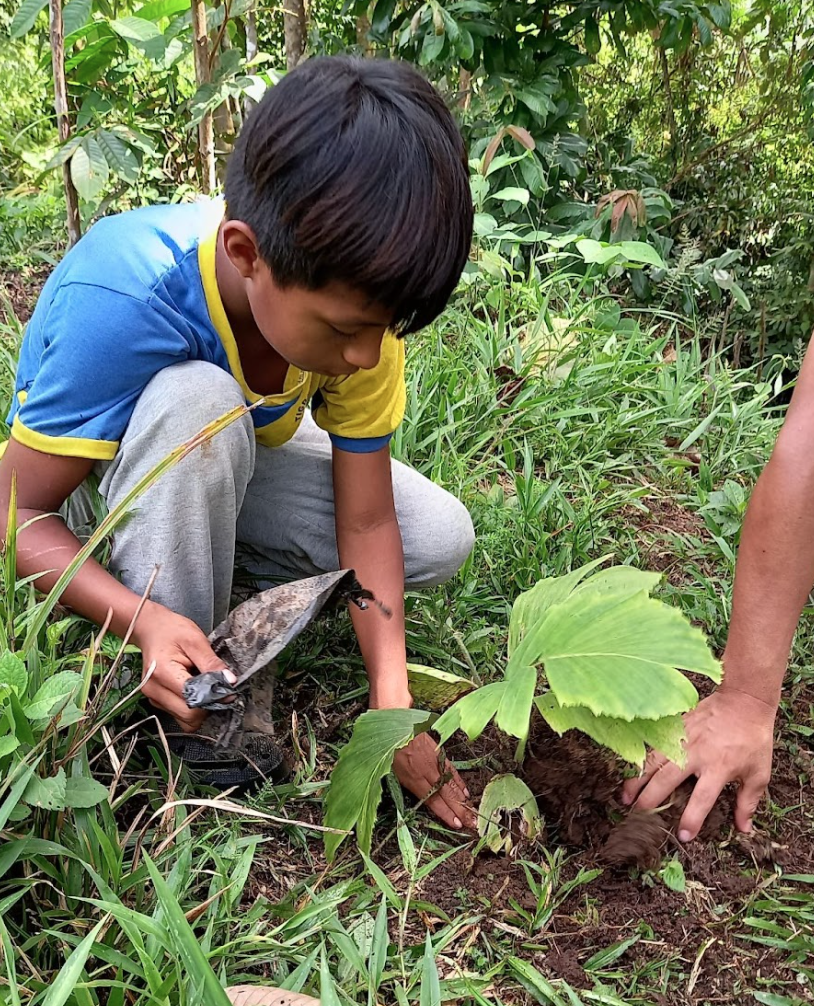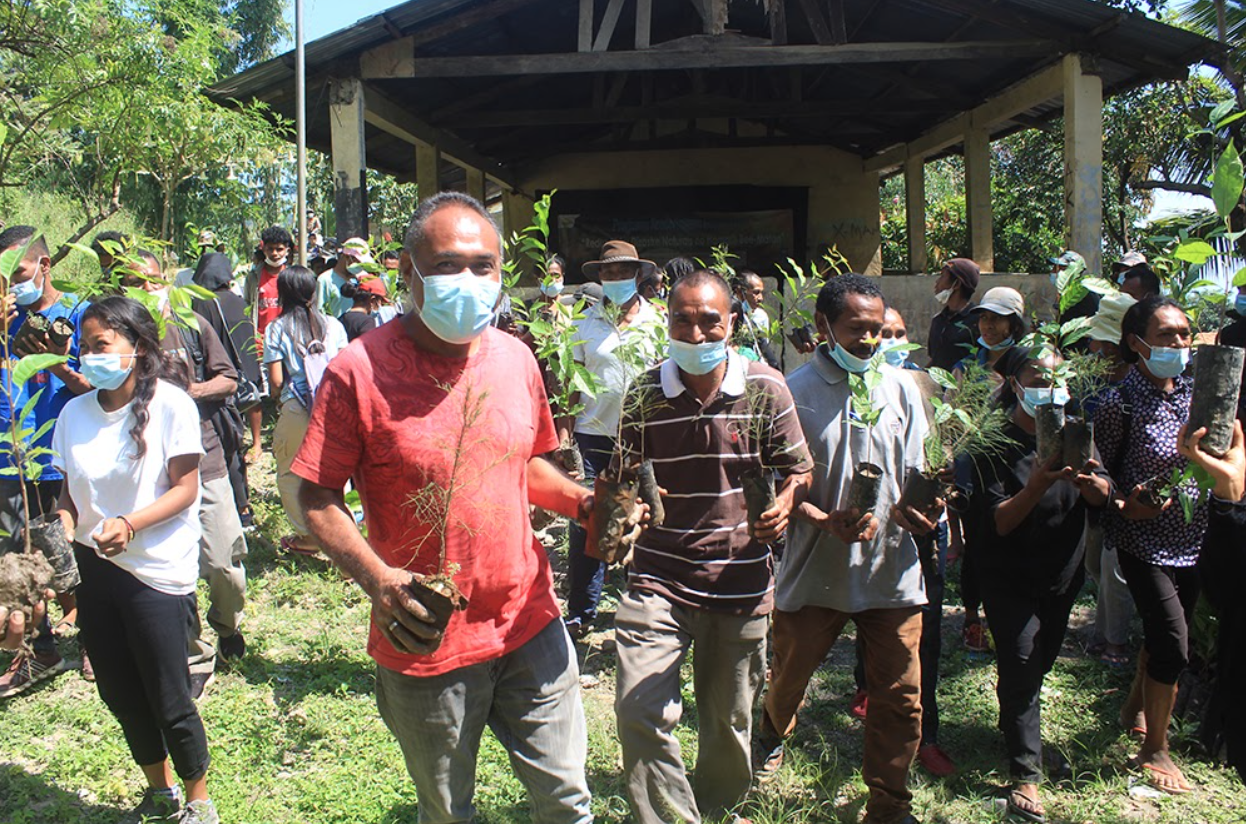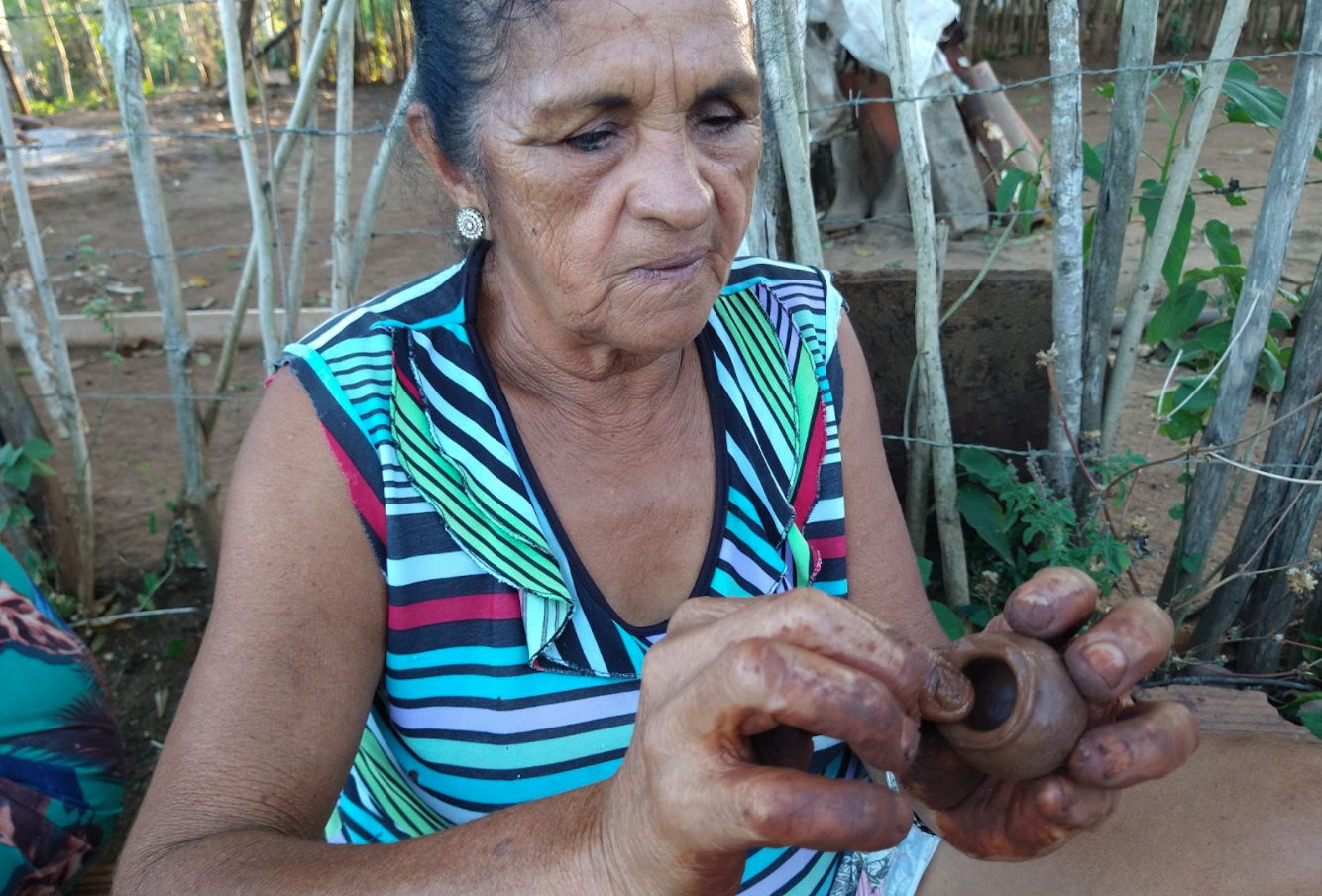
More Prizes Than Ever Before

20 prizes awarded as part of the Lush Spring Prize 2021 for environmental and social regeneration, celebrating the work of regenerative practitioners all over the world.

Photo: From Sacha Kuyrana Maltakuna – Young Kichwa Defenders of the Forest. Derek Tanguila is planting a Chontilla Palm. This fast growing and productive palm produces edible fruits and seeds, and is beneficial for many species of birds including Tanagers and Toucans..
2021 Lush Spring Prize recipients have been announced as part of a week-long online event.
Prize recipients are working around the world in a diverse range of fields including landscape restoration, food and farming, climate change mitigation and adaptation, Indigenous rights, and empowering women and other marginalised groups. While projects may have different focuses, they all take holistic and regenerative approaches to solving the challenges they face, with many being led by members of the communities they are working in.
The 2021 prizes are awarded across six categories: Intentional, Young, Established and Influence Awards, a Youth In Permaculture Prize (run in partnership with Abundant Earth Foundation) and an Ancient and Indigenous Wisdom Award (run in partnership with Be The Earth Foundation); investing more than £220,000 in regenerative work.
The 20 prize recipients of the 2021 LUSH Spring Prize are:
| Influence Projects Award |
| Fambidzanai Permaculture Centre (Zimbabwe) |
| Gaza Urban & Peri-urban Agriculture Platform (Palestine) |
| Landworkers’ Alliance (UK) |
| Established Projects Award |
| Permatil (Timor-Leste) |
| Instituto Mesoamericano de Permacultura (Guatemala) |
| Young Projects Award |
| Kenyan Peasants League (Kenya) |
| Comunità Frizzante (Italy) |
| Food Secured Schools Africa (Ethiopia) |
| Education for Climate Action for Peace (Malaysia) |
| Intentional Projects Award |
| Fundación Cuidemos Paraísos (Chile) |
| Permaqueer (Australia) |
| Mount Oku Center for Gender and Socioeconomic Empowerment (Cameroon) |
| Sacha Kuyrana Maltakuna-Young Kichwa Defenders of the Forest (Ecuador) |
| Ancient and Indigenous Wisdom Award |
| Associação Centro de Cultura Sabuká Kariri Xocó (Brazil) |
| The Marginalized Mirror (Namibia) |
| An organisation that would prefer not to be named. |
| Youth in Permaculture Prize |
| Sacha Kuyrana Maltakuna – Young Kichwa Defenders of the Forest (Ecuador) |
| Education for Climate Action for Peace (Malaysia) |
| Malawi School Permaculture Clubs (Malawi) |
| SCOPE Kenya |
Project profiles
Information about the 2021 Spring Prize recipients (and the shortlist) can be found on the Spring Prize website.
Examples of this year’s awarded projects include:
- Education for Climate Action for Peace (Malaysia) – Young Award Education for Climate Action for Peace (E4CAP) was birthed in October 2019 to combat adverse climate change and to provide sustainable living education and livelihood preparedness training to refugees and stateless teens and youths that don’t have access to mainstream education and cannot work legally in Malaysia. E4CAP is a collaboration between Permaculture Design Certification course alumni, including refugee teens.

Image: Permatil co-founder Ego Lemos (front) with local community, Permatil staff and local officials, planting native trees.
- Permatil (Timor- Leste) – Established Award Empowering people through community-driven permaculture projects since 2001, Permatil recognised the urgent need to regenerate Timor-Leste’s natural environment and create sustainable livelihoods and resilient communities, while strengthening culture and traditional knowledge. Permatil plans and implements permaculture projects with communities across Timor-Leste, while training future trainers, including NGO and government staff, community leaders and local farmers. They also focus on water restoration, working to rehabilitate springs for 174 communities.
- Instituto Mesoamericano de Permacultura (Guatemala) – Established Award Instituto Mesoamericano de Permacultura (IMAP) started in 2000 in San Lucas Tolimán, on the shores of Lake Atitlán in the Mayan highlands of Guatemala. It was created by a group of Maya Kakchiquel folk with the desire to use native seeds, permaculture, traditional Indigenous knowledge and education to create social healing after 36 years of internal armed conflict that wiped out hundreds of communities and displaced millions from their land and disrupted the transfer of their culture and ancestral knowledge.
- Gaza Urban and Peri-Urban Agriculture Platform: GUPAP (Palestine) – Influence Award Gaza Urban & Peri-Urban Agriculture Platform (GUPAP) enhances resilience, builds institutional capacity and supports collaboration amongst its eighty member Community Based Organisation; including advocacy and policy influencing campaigns and sharing of knowledge, success stories and experience at local, regional and global levels. GAPUP’s work responds to the challenging urban protracted crisis context of the Gaza Strip; where economic opportunities are very limited and urban agriculture is not officially recognised by policy makers and planners.

mage: Valdete da Silva making a clay pot with the Associação Centro de Cultura Sabuká Kariri Xocó community.
- Associação Centro de Cultura Sabuká Kariri Xocó (Brazil) – Ancient and Indigenous Wisdom Award The Kariri-Xocó sleep and wake up fighting for their existence. Within their territory is a unique biome: the meeting of the Caatinga – the only exclusively Brazilian biome – with the Atlantic Forest. Their village is located on the banks of the Opará, the São Francisco River in Brazil. Yet, even so, their lands and plants are dry because the river suffers.
The Centro de Cultura Sabuká Kariri-Xocó was born with the mission of fighting for the preservation of their life and that of all the beings that live there. It gathers children, young people and elders to be together, as their ancestors did. In addition to nurturing culture, they plant community gardens, harvest and feed themselves in groups of up to 100 people a day, and hold their Torés, dialogues, games, football and other activities.
They dream of taking back ancestral memory and guaranteeing food, collective work, union and the strengthening of their culture. With this project they see a great possibility of survival for their ethnic group and village. It provides the hope of resistance for their people.
“As a result of colonialism, we are made to believe less in ourselves. We have been made to think more about the Western way of thinking and Western knowledge systems. Now, we need to move away from that. We need Indigenous people to understand the value of their own Indigenous systems and knowledge bases. Our Indigenous knowledge systems can help solve climate change. Our knowledge systems are at one with nature.” – Francis Shomet, Ancient and Indigenous Wisdom Prize judge, 2021
The Event
As government officials begin to gather in Glasgow for the 26th UN Climate Change Conference, the Spring Prize community will gather online to celebrate and highlight the important role that holistic, regenerative approaches must play when facing the complex challenges posed by the climate crisis.
To creatively respond to the travel restrictions and health risks of the pandemic, the Spring Prize 2021 event will take place online for the first time, with local events being hosted in 16 countries by prize recipients.
The event is designed with the aim of providing awarded projects’ members with the opportunity to share their stories, expertise and ideas in an inclusive and collaborative environment.
Also attending the event are Spring Prize judges, press and representatives from other organisations.
What is the LUSH Spring Prize?
Launched in 2017, the Lush Spring Prize is now in its fourth year of celebrating and awarding prizes to groups working toward eco-social regeneration. It is a joint venture between LUSH Cosmetics and Ethical Consumer, and has distributed more than £820,000 to date.
It was set up to support ‘regenerative’ projects – those that go beyond sustainability by taking holistic approaches to building the health of ecology, economy and social systems.
By supporting regenerative projects, the Spring Prize hopes to raise the profile of the movement as a whole to inspire more individuals, groups, communities, funders and businesses to start engaging with regenerative processes.
People all over the world are developing and remembering ways to live in cooperation with nature and each other. They are resisting further damage, restoring ecosystems, generating renewable resources, nurturing solidarity and building health, wholeness and resilience. The Lush Spring Prize supports and celebrates their work through:
- A biennial £200,000+ prize fund. This is open to communities, organisations and businesses from the Intentional stage, through to Young and Established organisations, and Influencers.
- Events that bring people together to share their skills and experience.
- Publicity to raise awareness of regeneration and its potential to heal damaged systems.
The 2021 Lush Spring Prize received over 400 applications, which were shortlisted to a group of 54 in June and July this year. The prize saw a 61% increase in reach, with applications being submitted by inspiring projects spanning 81 different countries and every continent except Antarctica.
Projects were driven by a range of stakeholders, including grassroots campaigners, small scale agro-ecological producers, regenerative businesses, Indigenous-led groups, academics, global solidarity networks and think tanks. Their work addresses multiple issues needed to support life, including ecosystem restoration, regenerative food production, building communities, creating resilient housing and circular economies, whilst also supporting displaced people, protecting Indigenous rights and access to land.
Notes to the editors
Website: www.springprize.org (Contains descriptions of and links to all prize recipients and all shortlisted projects)
Who we are:
Lush Cosmetics (www.lush.com) The Prize is funded by Lush, a campaigning company with over 900 shops spanning 48 countries. Lush has provided funding for regenerative projects through grant programmes like the Re:Fund (Regeneration Fund) since 2010.
Ethical Consumer (www.ethicalconsumer.org) The Prize is coordinated by Ethical Consumer, a non-profit multi-stakeholder co-operative in the UK. Ethical Consumer’s research and publishing supports consumer power to generate positive impacts for the environment, people, animals and society.
12:11